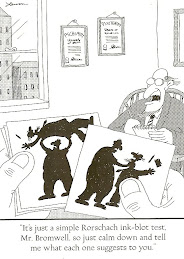We've all experienced depression that comes and goes: mild, spontaneously low moods that get better all on their own and more moderate depressive episodes that are the result of traumatic life events (physical illness, loss of a job, the death of a loved one, divorce, etc.), but sometimes depressive symptoms like feeling tired and loss of appetite do not merely accompany physical illness, but represent physical illness itself. We call this clinical depression, to distinguish it from the doldrums that are otherwise commonly experienced, "the blues" that otherwise do not require formal treatment because they get better on their own.
If you are depressed and you think you might need to see a doctor about it, chances are already pretty good that you may be clinically depressed, meaning that your mood problem is more than situational, or a response to everyday stress, but has become something physical. This article will help you sort through some preliminary questions to help you determine if what you may be suffering is due to (for lack of a better term) a "chemical imbalance."
Many people suffer unnecessarily--sometimes for years--with clinical depression and don't even know it. They may think that the way they feel is just part of life, or they may have been depressed for so long that they have actually grown insensitive to their symptoms and not even realize that, for example, their energy level is much lower than normal and their ability to enjoy life is seriously compromised. I've interviewed patients who were obviously depressed, individuals who were overtly suffering from major depression that could almost be diagnosed on sight, who nonetheless denied ever experiencing depression when asked! But if you know you are depressed and just aren't sure whether you have crossed the line into a medical condition, consider the following:
When in doubt, consult with a professional. In other words: see a doctor. See a doctor, see a doctor, see a doctor, because only a qualified physician can diagnose, and ultimately treat, major depression. If you already see a therapist or counselor or have access to a nurse, social worker or some other type of mental health professional, you may want to start there.
Symptom severity. How severe are your symptoms? This is the most important consideration, because regardless of the cause of your condition--whether purely physical versus largely situational--the decision to treat with medication will ultimately be based upon 1) your degree of impairment and 2) the likelihood that your symptoms will improve on their own in a reasonable amount of time. Are your symptoms interfering with your ability to function at work or school, or are they negatively impacting your relationships? One criterion professionals use in diagnosing clinical depression and recommending medical treatment is the fact that mood symptoms are interfering with "normal social and occupational functioning."
Suicidal Ideations. This symptom is, by definition, severe. While most of us have, at one time or another in our lives, experienced fleeting, passive thoughts along these lines, it is never "normal" to seriously contemplate suicide. Serious thoughts involve formulating a plan, even if it's only imagining what you would do, or obsessing on thoughts of harming yourself. In the event of so-called active suicidal ideations, seek help immediately.
Many people admit to suicidal thoughts when depressed but believe that they would never act on them (called "passive suicidal ideations"). While this may be somewhat reassuring, remember that suicide attempts are often impulsive acts. Serious, ongoing thoughts of death that are part of a depressive episode always indicate the need for professional treatment, if not actual medical management.
Length of illness. How long have you felt depressed? Major depressive episodes typically last 6-9 months, but can last a few weeks to many years. The longer you have been waiting to "feel like yourself again," the more likely it is that there is something biologically awry. And while untreated major depressive episodes typically resolve on their own--eventually--they do tend to recur, and without treatment, successive episodes tend to be longer and more severe.
When other remedies aren't working. When symptoms are moderate to severe and things like exercise, stress reduction, talk therapy, and even over-the-counter homeopathic remedies (like
Family history. Another indication that what you are experiencing is largely physical, as opposed to situational, is a positive family history. If you have a relative that has been diagnosed with clinical depression, you have a significantly higher probability of being affected sometime in your lifetime yourself, particularly in the case of a first-degree relative (parent, sibling, or child).
If you are having serious symptoms and you have any family history at all, you should be evaluated, and especially if you have a family member who was successfully treated you should definitely consider being treated yourself. Moreover, there is evidence to suggest that if a family member did well on a particular medication, you are more likely to do well on the same medication, so keep that in mind when discussing treatment options with your physician.
Any family history of suicides, completed or attempted, in relatives who may or may not have been diagnosed or treated is also very important to discuss with your doctor. Of course, family history is not always present, even in cases of unequivocal major depression, so you can never rule it out based on a negative family history.
No reason for feeling down. When depressive symptoms are moderate to severe and they persist, but there is no obvious cause, or stressor, a physical condition may be suggested. If you feel negative and you are having crying spells "for no reason," the reason may be biological. Many women are familiar with this phenomenon as part of premenstrual dysphoria (PMS, PMDD), when hormonal changes result in increased anxiety, irritability and tearfulness when nothing in the environment is specifically provoking those heightened emotional reactions. In this case we say the mood problem is endogenous, because it is caused by factors within the body.
Not all endogenous mood episodes require treatment with psychotropic medications, of course; many such episodes are mild or transient or both, and so do not require medical treatment, but some episodes are moderate to severe and protracted and so medical treatment is at least worth considering, if not vital. Hormonal shifts are one common cause, but other forms of clinical depression are thought to originate in the central nervous system itself and are to-date poorly understood. Both men and women who are predisposed can experience these endogenous changes in mood, which, unlike premenstrual symptoms which typically last only a few days, can last weeks, months, and even years.
While spontaneous, endogenous mood episodes indicate a potential need for medical intervention, the thing to keep in mind here is that even situation-specific despair can sometimes require treatment, if the symptoms are severe and do not improve on their own over time. Many major depressive episodes have been precipitated by grief, for example, where losing a loved one to death or divorce triggers a depressive reaction that starts exogenously, but that essentially becomes maintained and exacerbated by endogenous processes. However it starts, when depression becomes progressively devastating to the person who is suffering, medical intervention is warranted.
Neurovegetative signs. Besides the severity of the symptoms, the nature of the symptoms themselves can be important clues. An abundance of so-called "neurovegetative symptoms" strongly suggests physical disease. These are symptoms of the body, as opposed to the mind. Things like psychomotor retardation, which is being slowed down, consisting of any one or more of the following: low energy, difficulty concentrating, finding that it takes great effort to get out of bed, to stay active, even to talk and think, at the more extreme end (if this is the case, medical treatment is definitely necessary!). Other neurovegetative signs of depression include loss of appetite with significant weight change, loss of sexual appetite, and trouble sleeping, or sleeping too much. On the flip side, weight gain is sometimes seen in depression.
The more physical manifestations there are in general, the more physical the problem, obviously. So if there are crying jags that don't stop and fairly rapid, unintentional weight changes in either direction, with disturbed sleep, low energy and difficulty concentrating, a physical examination is in order, at the very least. There are a number of medical conditions (apart from major depression itself) that can present in this way, including endocrine problems, that can easily be ruled out with simple lab tests.
Early Morning Awakening. Perhaps the most common physical manifestation of depression is insomnia. It is so common, however, both in the context of depression and in persons who are not depressed, that by itself insomnia is hardly indicative of a need for the medical treatment of one's mood. However, while there are various kinds of sleep disturbances in depression, one special kind of insomnia that is classically seen and which strongly suggests physical depression is early morning awakening. This involves routinely waking up, completely and spontaneously, several hours before the alarm clock (3 a.m. or 4 a.m., usually), and being unable to get back to sleep. This is a "textbook symptom" that isn't always present, but when it is, it strongly suggests physical depression over situational depression, which is more commonly associated with difficulty falling asleep at the beginning of the night (for example, due to excessive stress and worrying).
Depression worse in the morning. Another hallmark of endogenous depression is that it is much worse after sleep. Turning the brain off for prolonged periods during sleep exacerbates endogenous depression, such that people with physical depression usually feel their worst first thing in the morning (or after a long sleep), and then, as the day goes on, the brain revs up, energy increases and they feel a little better. Whereas depression that is primarily due to an unhappy life situation (a stressful job, a bad marriage, etc.) usually adopts the opposite pattern: mood becomes progressively more negative and agitated as the day, and the day's problems, wear on.
Pregnancy. Depressive symptoms following a pregnancy due to sudden hormonal shifts at delivery are quite common and do not always represent full-blown postpartum depression; the "postpartum blues" are typically brief and mild and spontaneously improve over a few days, but any such depression is by its nature physical, should be closely monitored, and if moderately severe or persistent, treated. A woman who has just given birth should have a very low threshold for discussing her mood symptoms and the potential need for treatment with her obstetrician.
Similarly, significant, persistent changes in your mood following surgery or some other major medical procedure or medical event, including the initiation of a new prescription medication, strongly suggests the onset of a physical depression that may or may not require treatment with a psychotropic agent. In some cases it's as simple as stopping a new medication that's causing depression; in others it's a matter of addressing some other complication of treatment.
Anhedonia. Other cardinal symptoms that are not themselves strictly physical but that are clearly associated with neurological and biochemical deficits and that therefore suggest clinical, or physical, depression, include a loss of the ability to experience pleasure (called anhedonia), feelings of excessive guilt, excessive regret, hopelessness, helplessness and feelings of worthlessness. Whenever any of these are present, especially when they are excessive, even irrational, major depression is suggested, and no amount of talk therapy will make them better.
Whatever your concerns or suspicions, if it's getting worse, consult with a professional. And if you have experienced prior episodes--even if they eventually got better on their own (as most do)--get a consult, because untreated major depressive episodes become more frequent and more severe over time.
There is an adage that says that if you show a carpenter a nail, he'll hammer it, because a) he has the hammer already in hand and b) that's what carpenters do. This truism extends to all professions. If you consult with a psychiatrist, the chances are very high that you will be offered prescription treatment for your symptoms. In part this is due to an honest selection bias: if you have taken the time and trouble to make an appointment with a mental health specialist with prescriptive authority, chances are your symptoms are severe enough that you require some form of specialized treatment, and if you have been referred there by your primary care physician, chances are that other options have been explored and exhausted. But some people end up talking to a physician who routinely prescribes psychotropic medications who don't necessarily need psychotropic medication, so be sure that your doctor engages you in a comprehensive discussion about your situation before jumping to mental health treatment options that require a prescription pad.


